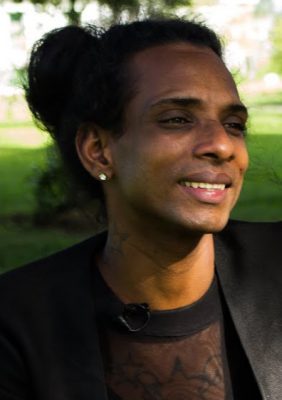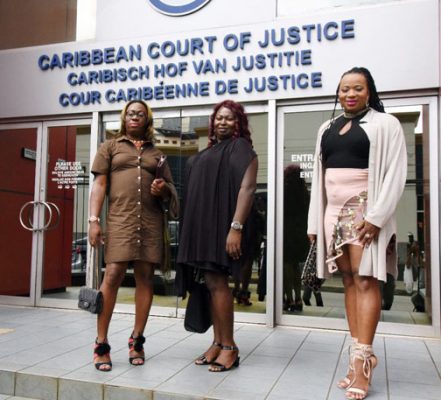With no Law Reform Commission currently in place, and having regard to constitutional provisions which save pre-independence laws, some legal minds are of the view that it is highly unlikely that Guyana will be complying any time soon with the recent directive given by the Caribbean Court of Justice (CCJ) to strike out the entire section of the law prohibiting cross-dressing.
However, Kamal Ramkarran, one of the attorneys who represented the state against which the challenge to the cross-dressing law was brought by a group of transgender women, has said that the mere pronouncement by the Trinidad-based final court effectively strips the impugned section from the law books.
Having lost at both the local Supreme and Appeal Courts, transgender women—Quincy McEwan, known as Gulliver, Seon Clarke, known as Angel Clarke, Joseph Fraser, also known as Peaches Fraser, and Seyon Persaud, known as Isabella Persaud—had appealed all the way to the CCJ—the court of last resort for Guyana, where they argued that the law prohibiting cross-dressing discriminated against them.

Their main contention had been that Section 153 (1) (XLVII) of the Summary Jurisdiction (Offences) Act, which prohibits cross-dressing “for an improper purpose,” was so vague that it does not define what constitutes an “improper purpose,” which ultimately leads to uncertainty.
Overturning judgments of the local courts, the CCJ earlier this month ruled in favour of the appellants that the provision violated their freedom of expression and, as such, needed to be struck from the laws of Guyana.
Asked what would be the way forward for Guyana in ridding the impugned section from its law books, a number of senior attorneys, who asked not to be named, have said that there are implications for removal, since that particular law is a pre-independence one and is protected/saved by the Savings Law Clause as provided for in Article 152 of the constitution—and therefore cannot be removed.
In accordance with that article, subsection one states, “except in proceedings commenced before the expiration of a period of six months from the commencement of the constitution, with respect to a law made under the Guyana Independence Order 1966 and the constitution annexed thereto, nothing contained in or done under the authority of any written law shall be held to be inconsistent with or in contravention of any provision of articles 138 to 149 (inclusive) to the extent that the law in question,” among other things, “is a law (in this article referred to as “an existing law”) that had effect as part of the law of Guyana immediately before the commencement of the constitution, and has continued to have effect as part of the law of Guyana at all times since that day.”
Section 153 (1) (XLVII), it was explained by attorneys, is one such law which predates independence and which is protected by the savings clause and therefore cannot be removed.
Citing the Barbadian cases of Nervais v R and Severin v R decided by the CCJ on June 27th of this year, mere months before it would rule in the challenge mounted by the Guyanese transgender women, however, Ramkarran pointed out that it was that very court which said that the savings clause could not stand once it stands in contravention of the constitution which is the law.
Article 8 of the Guyana constitution states, “this constitution is the supreme law of Guyana and, if any other law is inconsistent with it, that other law shall, to the extent of the inconsistency, be void.”
The CCJ in Nervais v R and Severin v R declared that the general savings clause “is an unacceptable diminution of the freedom of newly independent peoples who fought for that freedom with unshakeable faith in fundamental human rights.”
Colonial regime
It went on to state further that the idea that even where a provision is inconsistent with a fundamental right, a court is prevented from declaring the truth of that inconsistency just because the laws formed part of the inherited laws from the colonial regime “must be condemned.”
Referencing writings in Caribbean Constitutional Reform: Rethinking the West Indian

Polity (2002), the court noted that to give literal effect to savings provisions as written, was to deny any special eminence to the constitution and in particular, its fundamental rights over all other law.
The author, the court highlighted, emphasised that the “horror of this is brought home to the intelligent mind when one realizes that the literal consequence is to give prominence to ordinary legislation over the constitution.”
The CCJ said it is incongruous that the same constitution, which guarantees that every person in Barbados is entitled to certain fundamental rights and freedoms, would deprive them in perpetuity from the benefit of those rights purely because the deprivation had existed prior to the adoption of the constitution.
“With these general savings clauses, colonial laws and punishments are caught in a time warp continuing to exist in their primeval form, immune to the evolving understandings and effects of applicable fundamental rights. This cannot be the meaning to be ascribed to that provision as it would forever frustrate the basic underlying principles that the constitution is the supreme law and that the judiciary is independent,” the court said.
Applying these principles as precedent to the case of the Guyanese transgender women, the court of last resort reasoned that Section 153(1) (xlvii) should not be deterred by the savings law clause.
“And, if we find that the section is inconsistent with the fundamental rights laid out in the constitution, we are entitled to treat accordingly with it,” the court said.
Ramkarran said that the implications are, therefore, that the CCJ will construe the savings law clause very strictly and will not permit the breaching of fundamental rights to be protected by laws which existed before the constitution as that would lead to an anomalous situation which could not have been intended by the framers of the constitution.
Against this backdrop, counsel reasoned that there is no need for any further action on the part of any person or organisation.
“The law has been removed from the books by the CCJ,” Ramkarran asserted.
Articles 138-149 of Guyana’s constitution provides for protection of fundamental rights and freedoms of the individual. Protection of freedom of expression— which McEwan and others argued was violated by the impugned section, is provided for in Article 146.
It states, “Except with his own consent, no person shall be hindered in the enjoyment of his freedom of expression, that is to say, freedom to hold opinions without interference, freedom to receive ideas and information without interference, freedom to communicate ideas and information without interference and freedom from interference with his correspondence.”
Subsection two of that article goes on to state, “Nothing contained in or done under the authority of any law shall be held to be inconsistent with or in contravention of this article to the extent that the law in question makes provision.”
Subsection three then notes that freedom of expression in the article does not relate to hate speeches or other expressions, in whatever form, capable of exciting hostility or ill-will against any person or class of persons.
Declaring Section 153 (1) (XLVII) to be unconstitutional, the CCJ said the law was from a different time and no longer served any legitimate purpose in Guyana, while noting that it did violate the appellants’ fundamental right to freedom of expression.
Against this background, the court ruled it needed to be struck from the law books.
On this point, the court also referenced Article 149 (1) of the constitution which provides for protection from discrimination.
It states, “subject to the provisions of this article, no law shall make any provision that is discriminatory either of itself or in its effect; and no person shall be treated in a discriminatory manner by any person acting by virtue of any written law or in the performance of the functions of any public office or any public authority.”
Inextricably bound
It reasoned that a person’s choice of attire is inextricably bound up with the expression of his or her gender identity, autonomy or individual liberty. That choice, the court further declared, is an expressive statement protected under the right to freedom of expression.
President of the court, Justice Adrian Saunders had said that no one should have to live under the constant threat that at any moment, for an unconventional form of expression that poses no risk to society, he or she may suffer such treatment.
Section 153 (1) (XLVII) makes every man who appears in “female attire” and every woman who appears in “male attire,” in any public way or public place “for any improper purpose,” liable to a fine of not less than $7,500 or more than $10,000.
In 2010, the appellants were all charged and placed before a city court, where they were fined $10,000 each for wearing female attire for an improper purpose under the impugned section.
At the time of her arrest, McEwan had been dressed in a pink shirt and a pair of tights along with a black hair piece, while Clarke wore a jersey and skirt. Meanwhile, Fraser and Persaud, who both wore skirts, each also wore red and black wigs.
In its ruling of November 13th, Justice Saunders said the court held that the law was indeed unconstitutionally vague, violated the appellants’ right to protection of the law and was contrary to the rule of law.
Resultantly, the court upheld the appeal on the basis that the law resulted in transgendered and gender nonconforming persons being treated unfavourably by criminalising their gender expression and gender identity.
Agreeing with arguments advanced by the appellants—in a unanimous ruling, Justices Saunders, Maureen Rajnauth-Lee, Jacob Wit, Denys Barrow and Winston Anderson all held that at the heart of the right of equality and non-discrimination, lies a recognition that a fundamental goal of any constitutional democracy is to develop a society in which all citizens are respected and regarded as equal.
Apart from what they say are difficulties with getting rid of the law owing to the savings law clause, senior attorneys have also opined that this would be an uphill task since there is currently no functional Law Reform Commission (LRC).
The commission’s role is the reforming of the country’s legislation, ensuring that it meets international standards.
Established by the Law Reform Commission Act No. 4 of 2016, the independent body is to consist of not less than three or more than seven members who are to be appointed by the president, acting after consultation with the Minister of Legal Affairs.
The Act is to provide for the establishment of a Law Reform Commission for keeping under review the laws of Guyana for the purpose of their simplification, modernisation, systemic development and reform, and for connected matters.
Among other things, the commission’s functions are to receive and consider suggestions for the reform of the law which may be forwarded to it either on the invitation of the commission or otherwise, by judges, public officials, lawyers and members of the general public.
Though Attorney General (AG) and Minister of Legal Affairs, Basil Williams had earlier said that the commission was in a state of readiness to commence operations, Minister of Finance Winston Jordan on Monday during his 2019 budget presentation alluded to the contrary being the reality.
In response to questions posed in the National Assembly by Opposition Member of Parliament Anil Nandlall, Williams in June of this year had said that the LRC was almost up and running.
Stating that the commission was in its “final stages of readiness,” Williams had declared that persons had already been interviewed for the positions of commissioners and salary scales had already been worked out.
According to the AG, while no remuneration package had been approved for members of the LRC, he did identify the positions and listed the gross monthly salaries of the staff members who had been hired at that point.
He had said that one legal officer was hired and being paid a gross salary of $700,000; two legal clerks were each receiving $150,000; three typists each receiving $130,000; two office assistants each receiving $100,000; a driver receiving $120,000; and a cleaner receiving $75,000.
He had even identified a lot 59 Robb Street Bourda, Georgetown location where he said the commission would be housed and for which the government would have been paying a monthly rental of $850,000.
The rental was to run from December 1st of last year to today—November 30th, 2018 both days included.
A visit by the Stabroek News to that address last Friday, however, revealed a known grocery store which has been operating at that location for decades. It is still unclear where the commission’s building is located.
The government had disclosed that it had lodged $1.7 million as a security deposit as part of its rental agreement for any loss or damage to the property which was to be refunded upon completion of the tenancy.
The building was rented from Peter’s Hall, East Bank residents—Michael and Michelle Wharton. The agreement was entered into between the Whartons and Permanent Secretary of the Ministry of Legal Affairs, Delma Nedd, on behalf of the government on November 14th, 2017.
During his budget presentation on Monday, Jordan said that the LRC is expected to be become fully operational in the New Year, though he did not say exactly when or give any time frame.
Additionally, contrary to what Williams had indicated, Jordan told the House that the commissioners of the LRC are being identified, and once fully constituted and operational, the commission is anticipated to commence its critical role in the updating of laws in 2019.








